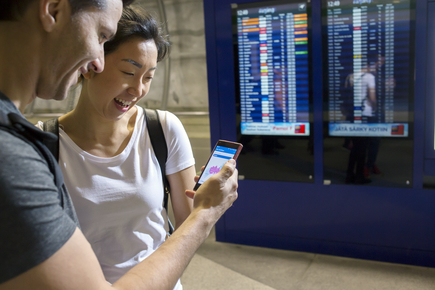
American economist Anthony Downs laid out a gloomy hypothesis for urban traffic congestion back in the 60’s. His Law of Peak-Hour Traffic Congestion states: “on urban commuter expressways, peak-hour traffic congestion rises to meet maximum capacity”. In other words, building new lanes will only help for a short while. The race to come up with longer-term solutions is now more intense than ever.
- Digital innovations will disrupt the mobility of people, goods, and services. Innovations will affect how we move – or whether we need to move in the first place.
Remote work and video conferencing have redefined the boundaries of when and where people need to travel. Thanks to the growth of online commerce, more and more goods and services are delivered to people, instead of people having to move about to look for them.
In Finland, urban mobility challenges are very moderate compared to larger countries, but the same trends still apply. Consequently, mobility solutions that gain traction in Finland will likely be competitive in other markets as well.
Technology service providers often consider Finland a pilot market. Finland’s small size, advanced infrastructure, and tightly networked society make it an ideal testbed for new solutions. This is a major asset for us Finns and all companies operating in Finland.
- Smart mobility is no exception. Finland and HSL are global forerunners in intelligent and innovative mobility solutions.
Several of our initiatives in Finland have attracted interest around the world. These include the Kutsuplus ride-pooling trial a few years ago, and the API we built to enable the Whim application to interact with the HSL ticketing system.
The next stage of enablers include the deregulation of Finland’s taxi market set to take effect in July, and the new generation API to HSL ticketing system, now open to all developers and service providers. The dynamic code of the new API allows for real-time payments. Upcoming new features include strong identification, which enables subsidized season tickets.
- The ”API Economy” based on open interfaces is at the very core of new digital and service-based offerings. These interfaces enable countless combinations of traditionally separate services.
We are confident that interfaces like the one opened by HSL will soon be introduced in several other markets. For consumers, benefits will include increasingly personalized, flexible, and smooth mobility services. For companies, opportunities are virtually unlimited, as mobility services can now be combined with pretty much anything.
Our goal at HSL is to accelerate the development of mobility services and to offer an opportunity for real-life testing with our customers. That’s why we are currently preparing a new innovation challenge, HSL IdeaLab. Its aim is to bring new smart mobility services to consumers within the HSL market area. Ultimately, we hope the services grow to become success stories both in Finland and internationally.
The HSL IdeaLab innovation challenge is open to both existing products and concepts that can soon be brought available for real customers. Interested? Keep your eyes and ears open: we’ll come back with more soon!
Read more: hsl.fi/idealab
Jemina Uusitalo
HSL’s MaaS Project Manager